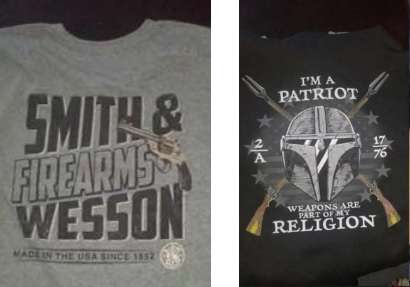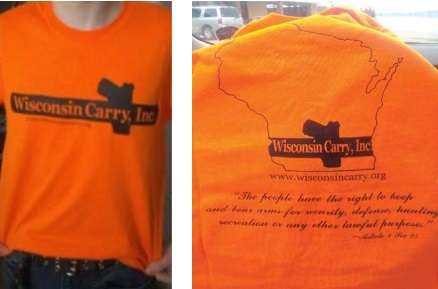The Volokh Conspiracy
Mostly law professors | Sometimes contrarian | Often libertarian | Always independent
Lawsuit Over Schools' Restriction on Pro-Gun Shirts Can Go Forward
N.J. v. Sonnabend, decided Friday by Judge William C. Griesbach (E.D. Wisc.) involved two students being told by their schools (Shattuck Middle School and Kettle Moraine High School) that they couldn't wear these T-shirts:


The districts claimed they should win as a matter of law, not on the grounds that the shirts caused some disruption, but on the grounds that the Wisconsin Carry shirt was just too orange they just weren't protected by the First Amendment:
Defendants contend that none of the shirts constitute protected speech primarily because the shirts fail to convey a particularized message, and because two of the shirts are "merely advertisements for companies that happen to have a picture of a firearm on them." …
No, said the court:
Clothing that bears explicit messages or symbols which are intended to convey a political or other message can clearly amount to speech entitling the wearer to First Amendment protection….
Defendants argue that in order for printed words or pictures on a shirt to receive constitutional protection, the message being conveyed must be clear and unmistakable. But that is not the law…. "[A] narrow, succinctly articulable message is not a condition of constitutional protection." If it was, the First Amendment "would never reach the unquestionably shielded painting of Jackson Pollock, music of Arnold Schöenberg, or Jabberwocky verse of Lewis Carroll."
Applying these principles to the pleadings in this case, the court concludes that each of the shirts at issue plausibly falls within the protection afforded by the First Amendment. Defendants argue that the Smith & Wesson shirt is not protected speech and is instead an advertisement for a company that just happens to contain a picture of a firearm. Because it is merely the name of a company with the image of a firearm on a shirt, they claim the shirt fails to convey any "particularized message," such that it would be entitled to protection by the First Amendment. N.J., for his part, argues that even if it is commercial speech, the shirt is still entitled to some constitutional protection.
Commercial speech is "speech that proposes a commercial transaction." In wearing his Smith & Wesson shirt to school, N.J. was not proposing a commercial transaction, at least according to the complaint. Plaintiffs allege in their complaint that each of them "believes in the value to society of personal possession of arms as guaranteed by the Second Amendment." … [Both the Smith & Wesson shirt and the I'm a Patriot Shirt] are intended to convey N.J.'s belief in the importance of the right to bear arms.
The same is true of the WCI shirt that A.L. sought to wear at the Kettle Morraine High School. Defendants argue that the WCI shirt is merely an advertisement, and that in any event, the shirt does not convey any particularized message. They contend that the court should not consider the text from the Wisconsin Constitution on the back of the shirt because it is not included in the description of the shirt set out in the complaint. It is well-established, however, that "documents attached to a motion to dismiss are considered part of the pleadings if they are referred to in the plaintiff's complaint and are central to his claim. Such documents may be considered by a district court in ruling on the motion to dismiss."
While not strictly speaking a "document," the WCI shirt is the equivalent and serves the same purpose in this case. The WCI shirt is referred to in A.L.'s complaint and is central to his claim. The court therefore considers the message of the entire shirt and not just the language and image of a handgun on the front of the shirt, though the front alone would appear to be constitutionally protected for the same reason as the message conveyed by the Smith & Wesson shirt.
Not only did Plaintiffs intend to convey a clear message in wearing their shirts, it also seems clear that school authorities understood the message Plaintiffs were intending to convey, at least to the extent their message included an appreciation for the right to own firearms. School officials are alleged to have told both N.J. and A.L. that they were prohibited from wearing the shirts because of their depiction of firearms. Based on the allegations of the complaint, it at least appears that the school officials' response to N.J.'s shirts was motivated by the very message N.J. sought to convey in a school setting.
Each of the shirts at issue is therefore entitled to constitutional protection. That protection, of course, is not absolute. Whether Defendants were justified in prohibiting Plaintiffs from conveying their messages in the manner and place chosen by them remains to be decided. Defendants' motion for judgment on the pleadings on the ground that the shirts lack constitutional protection, however, is denied….
Quite correct, I think. For more on K-12 student speech rights, see:


Show Comments (23)